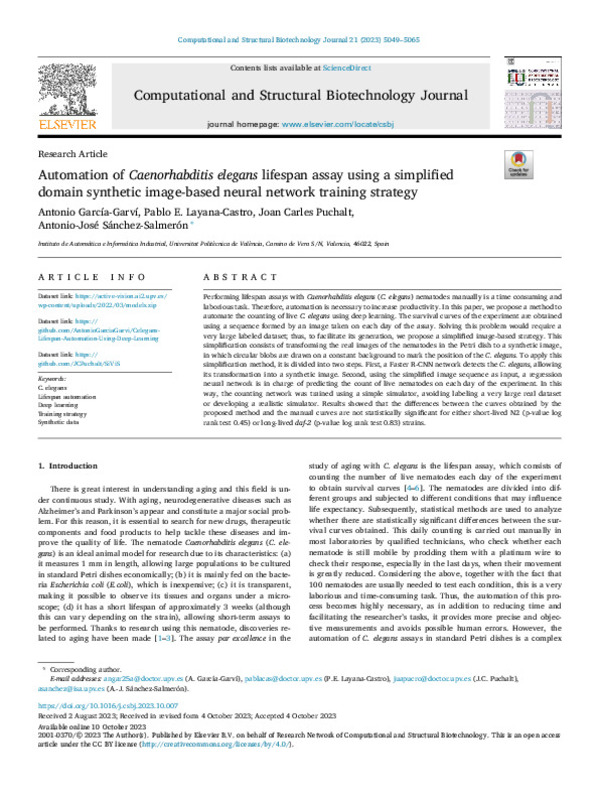JavaScript is disabled for your browser. Some features of this site may not work without it.
Buscar en RiuNet
Listar
Mi cuenta
Estadísticas
Ayuda RiuNet
Admin. UPV
Automation of Caenorhabditis elegans lifespan assay using a simplified domain synthetic image-based neural network training strategy
Mostrar el registro sencillo del ítem
Ficheros en el ítem
| dc.contributor.author | García-Garví, Antonio
|
es_ES |
| dc.contributor.author | Layana-Castro, Pablo Emmanuel
|
es_ES |
| dc.contributor.author | Puchalt-Rodríguez, Joan Carles
|
es_ES |
| dc.contributor.author | Sánchez Salmerón, Antonio José
|
es_ES |
| dc.date.accessioned | 2023-12-19T19:01:59Z | |
| dc.date.available | 2023-12-19T19:01:59Z | |
| dc.date.issued | 2023 | es_ES |
| dc.identifier.uri | http://hdl.handle.net/10251/200928 | |
| dc.description.abstract | [EN] Performing lifespan assays with Caenorhabditis elegans (C. elegans) nematodes manually is a time consuming and laborious task. Therefore, automation is necessary to increase productivity. In this paper, we propose a method to automate the counting of live C. elegans using deep learning. The survival curves of the experiment are obtained using a sequence formed by an image taken on each day of the assay. Solving this problem would require a very large labeled dataset; thus, to facilitate its generation, we propose a simplified image-based strategy. This simplification consists of transforming the real images of the nematodes in the Petri dish to a synthetic image, in which circular blobs are drawn on a constant background to mark the position of the C. elegans. To apply this simplification method, it is divided into two steps. First, a Faster R-CNN network detects the C. elegans, allowing its transformation into a synthetic image. Second, using the simplified image sequence as input, a regression neural network is in charge of predicting the count of live nematodes on each day of the experiment. In this way, the counting network was trained using a simple simulator, avoiding labeling a very large real dataset or developing a realistic simulator. Results showed that the differences between the curves obtained by the proposed method and the manual curves are not statistically significant for either short-lived N2 (p-value log rank test 0.45) or long-lived daf-2 (p-value log rank test 0.83) strains. | es_ES |
| dc.description.sponsorship | This study was supported by the Plan Nacional de I+D with Project RTI2018-094312-B-I00, European FEDER funds and by Ministerio de Universidades (Spain) under grant FPU20/02639. ADM Nutrition, Biopolis SL, and Archer Daniels Midland provided support in the supply of C. elegans. Funding for open access charge: Universitat Politecnica de Valencia. | es_ES |
| dc.language | Inglés | es_ES |
| dc.publisher | Chalmers University of Technology | es_ES |
| dc.relation.ispartof | Computational and Structural Biotechnology Journal | es_ES |
| dc.rights | Reconocimiento (by) | es_ES |
| dc.subject | C. elegans | es_ES |
| dc.subject | Lifespan automation | es_ES |
| dc.subject | Deep learning | es_ES |
| dc.subject | Training strategy | es_ES |
| dc.subject | Synthetic data | es_ES |
| dc.subject.classification | INGENIERIA DE SISTEMAS Y AUTOMATICA | es_ES |
| dc.title | Automation of Caenorhabditis elegans lifespan assay using a simplified domain synthetic image-based neural network training strategy | es_ES |
| dc.type | Artículo | es_ES |
| dc.identifier.doi | 10.1016/j.csbj.2023.10.007 | es_ES |
| dc.relation.projectID | info:eu-repo/grantAgreement/AEI/Plan Estatal de Investigación Científica y Técnica y de Innovación 2017-2020/RTI2018-094312-B-I00/ES/MONITORIZACION AVANZADA DE COMPORTAMIENTOS DE CAENORHABDITIS ELEGANS, BASADA EN VISION ACTIVA, PARA ANALIZAR FUNCION COGNITIVA Y ENVEJECIMIENTO/ | es_ES |
| dc.relation.projectID | info:eu-repo/grantAgreement/ //FPU20%2F02639//Diseño, desarrollo y evaluación de técnicas basadas en visión artificial para automatización de experimentos con C. elegans/ | es_ES |
| dc.rights.accessRights | Abierto | es_ES |
| dc.contributor.affiliation | Universitat Politècnica de València. Escuela Técnica Superior de Ingenieros Industriales - Escola Tècnica Superior d'Enginyers Industrials | es_ES |
| dc.description.bibliographicCitation | García-Garví, A.; Layana-Castro, PE.; Puchalt-Rodríguez, JC.; Sánchez Salmerón, AJ. (2023). Automation of Caenorhabditis elegans lifespan assay using a simplified domain synthetic image-based neural network training strategy. Computational and Structural Biotechnology Journal. 21:5049-5065. https://doi.org/10.1016/j.csbj.2023.10.007 | es_ES |
| dc.description.accrualMethod | S | es_ES |
| dc.relation.publisherversion | https://doi.org/10.1016/j.csbj.2023.10.007 | es_ES |
| dc.description.upvformatpinicio | 5049 | es_ES |
| dc.description.upvformatpfin | 5065 | es_ES |
| dc.type.version | info:eu-repo/semantics/publishedVersion | es_ES |
| dc.description.volume | 21 | es_ES |
| dc.identifier.eissn | 2001-0370 | es_ES |
| dc.identifier.pmid | 37867965 | es_ES |
| dc.identifier.pmcid | PMC10589381 | es_ES |
| dc.relation.pasarela | S\501397 | es_ES |
| dc.contributor.funder | Archer Daniels Midland | es_ES |
| dc.contributor.funder | AGENCIA ESTATAL DE INVESTIGACION | es_ES |
| dc.contributor.funder | European Regional Development Fund | es_ES |
| dc.contributor.funder | Universitat Politècnica de València | es_ES |
| dc.contributor.funder | MINISTERIO DE UNIVERSIDADES E INVESTIGACION | es_ES |
| dc.subject.ods | 03.- Garantizar una vida saludable y promover el bienestar para todos y todas en todas las edades | es_ES |








